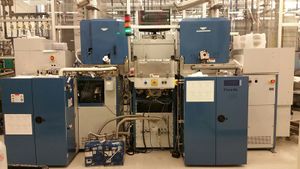Atomic Layer Deposition (Oxford FlexAL): Difference between revisions
(→About) |
|||
| Line 12: | Line 12: | ||
}} |
}} |
||
= About = |
= About = |
||
The Oxford Instruments FlexAL Atomic Layer Deposition system at UCSB is a plasma-enhanced ALD system for the precise growth of ultra-thin oxides and nitrides. Self-limiting layer by layer growth ensures precise control, film conformality, and repeatability of the films. The system currently has metallorganic precursors for Aluminum, Hafnium, Zirconium, and Silicon oxides and nitrides. Water |
The Oxford Instruments FlexAL Atomic Layer Deposition system at UCSB is a plasma-enhanced ALD system for the precise growth of ultra-thin oxides and nitrides. Self-limiting layer by layer growth ensures precise control, film conformality, and repeatability of the films. The system currently has metallorganic precursors for Aluminum, Hafnium, Titanium, Platinum, Zirconium, and Silicon oxides and nitrides. Water and Ozone are available for thermal oxides and Oxygen, Ammonia, Nitrogen, and Hydrogen are available for plasma assisted oxides and nitrides. Remote ICP plasma powers up to 600W are possible. The system is load-locked and can accommodate sample temperatures up to 550°C. Processing temperature windows are defined for each material based on growth limitations. The system is step-by-step programmable through a flexible GUI interface. In-situ ellipsometry between growth cycles and mass spectrometry during growth are both available. |
||
=Documentation= |
=Documentation= |
||
Revision as of 22:48, 13 July 2015
| |||||||||||||||||||||
About
The Oxford Instruments FlexAL Atomic Layer Deposition system at UCSB is a plasma-enhanced ALD system for the precise growth of ultra-thin oxides and nitrides. Self-limiting layer by layer growth ensures precise control, film conformality, and repeatability of the films. The system currently has metallorganic precursors for Aluminum, Hafnium, Titanium, Platinum, Zirconium, and Silicon oxides and nitrides. Water and Ozone are available for thermal oxides and Oxygen, Ammonia, Nitrogen, and Hydrogen are available for plasma assisted oxides and nitrides. Remote ICP plasma powers up to 600W are possible. The system is load-locked and can accommodate sample temperatures up to 550°C. Processing temperature windows are defined for each material based on growth limitations. The system is step-by-step programmable through a flexible GUI interface. In-situ ellipsometry between growth cycles and mass spectrometry during growth are both available.
